It’s a phrase every child is used to hearing while growing up, “treat others as you would like to be treated.” However, being kind goes far beyond benefiting the person who received a kind act, it can also have a wonderful impact on a person’s mental health!
Research shows being kind can reduce stress, improve emotional well being and even benefit physical health. So, what exactly does it mean to “be kind”? According to Psychology Today, kindness means, “a behavioral response of compassion and actions that are selfless; or a mindset that places compassion for others before one’s own interests. In performing the selfless act, a person may undercut their own selfish interests.”
We know that when a young person, or anyone, feels down and someone is unkind to them it can have devastating consequences. It’s the reason why many adults will never forget incidents in childhood or in school when a person was cruel or unkind to them. Youth who do not have a trusted support system to turn to are at a higher risk for self-destructive behavior like drug use and suicide. Suicide rates have increased amount U.S. teens for the past decade. Now, more than ever, acts of kindness can help.
The positive effects of kindness are experienced by everyone who witnesses the act, improving their mood and making them significantly more likely to “pay it forward.”

Science has proven that acts of kindness can increase;
· Serotonin
· Happiness
· Lifespan
· Pleasure
· Energy
· Oxytocin (the love hormone)
Acts of kindness can help decrease;
· Stress
· Pain
· Anxiety
· Depression
· Blood pressure
Youth who engage in acts of kindness tend to be more well connected, have higher levels of peer acceptance and are less likely to bully others. It’s important for adults to keep in mind the kind acts, or lack thereof, they’re modeling for youth. Adults can help encourage acts of kindness by;
1. Giving responsibilities and opportunities
2. Modeling acts of kindness
3. Inspiring positive actions toward others
4. Teaching empathy and compassion
Experts advise adults should avoid rewarding kind behavior because it makes it less likely that a child or youth will continue to be helpful. When kindness is authentically given and received it lifts the well-being and mood of everyone involved. Acts of kindness can be very little or very big. Here’s a list of a few acts of kindness to help get you and your family pointed in the right direction;
· Listen
· Smile
· Hug
· Hold a door for someone
· Pick up litter
· Compliment a friend, classmate, or family member
· Clean up after yourself
· Send a text to a loved one
· Notice someone who seems lonely and invite them along with you
· Let someone who wants to help you, help
· Don’t offer advice unless asked
· Share silence with someone
· Engage in random acts of kindness
· Engage in kind acts that are not random at all
· Send an inspirational quote to a friend
· Put a surprise note or drawing on someone’s desk
· Make someone laugh